Proposed law to curtail judicial checks, empower prison officials
Prisons IG will be given the right to order the parole of inmates, assign duties to prison officers

PHOTO: AFP
Titled the 'Sindh Prisons Correction Act, 2019', the new law will replace two older ones -- the Prisons Act, 1894 and the Prisons Act, 1900. The draft law was reviewed at a recent Sindh Cabinet meeting and it was decided to formally get it implemented after approval from the Sindh Assembly.
Under the draft law, the prisons IG will be appointed from among the existing deputy inspector generals (DIGs). The new changes empower the prisons IG to declare any place or location as a subsidiary jail where prisoners, irrespective of the nature of their crimes, could be temporarily or permanently detained. The IG will also be authorised to order the parole of inmates for various reasons.
Ombudsman calls for expediting jail reforms process
The proposed law will not only allow the prisons IG to make rules and regulations for the management and security of the prison, it will also authorise him to assign duties to prison officers with the approval of the home department.
Under the new law, the IG will also get the power to shift prisoners from one jail to another on the basis of medical grounds. Prisoners will also be able to request for their transfers to other jails.
In what could be seen as encroachment upon some judicial authority, the proposed law will empower jail superintendents to award better-class (B-class) jail facilities to prisoners - an authority which presently lies with courts. Jail superintendents' subject to the instructions of higher prison authorities, will also be able to order the release of prisoners even before the completion of their jail term.
Prisoners could also be released prematurely on the basis of incurable diseases, incapacitation or good conduct. In addition, elderly prisoners - aged 65 or above - will also be eligible for early parole.
In accordance with the draft law, government officers of grade 17 and above, mayors and district chairpersons of local governments will also be entitled to B-class facilities in jails. Currently, only provincial and National Assembly members and senators are eligible for the B-class facility. Likewise, under the new law, prisoners who pay over Rs50,000 per annum in taxes will also be able to avail B-class facilities.
Protecting human rights
The authors of the draft law have also suggested some measures aimed at "protecting the fundamental human rights of prisoners ensured in the Constitution of Pakistan". However, the implementation of these clauses will not be possible under the prevailing situation in jails. In this regard, the new law proposes that every prisoner will get to bathe and undergo a medical examination upon their arrival at the prison, they be provided with adequate diet along with clean drinking water as per the standards of the World Health Organisation (WHO). Another clause proposes that children and pregnant women shall be provided with a special diet to ensure their nutritional requirements.
According to the draft law, necessary measures will be taken to ensure general health conditions in prisoners' cells, including appropriate lighting, ventilation, cooling and heating facilities along with toilet and sanitary installations.
Three Pakistani children return home after release from Saudi jail
Official records show that a total of 25 prisons exist in the province, including five central prisons, 10 district jails, four prisons for youth offenders, four jails for women and one open jail. The open jail is situated in Badin district but has not been operational for a long time due to lack of security measures. At present, the vast majority of jails are overcrowded due to a high number of prisoners.
When contacted for comment, neither Prisons IG Muzaffar Alam Siddiqi nor Sindh Prisons DIG Nazir Ahmed Kazi responded to The Express Tribune despite repeated attempts. The personal staff officer (PSO) to the prisons IG, Shunail Shah, however, suggested to contact Syed Munawar Ali Shah, who was one of the committee members that was assigned task of drafting the new law.
Shah, who is currently the superintendent of Mirpurkhas district prison, informed that the prison law is being updated to incorporate internationally-accepted best practices in prisons regarding the rights of prisoners. He denied that the new law will grant more facilities to those who already enjoy privileges inside jails. He did, however, support increasing the powers of jails officials in the new law, "Incorporating best international practices in the new prison law will not only benefit prisoners, but it is also required administratively".
Published in The Express Tribune, March 16th, 2019.



















COMMENTS
Comments are moderated and generally will be posted if they are on-topic and not abusive.
For more information, please see our Comments FAQ